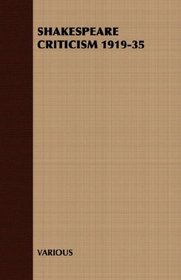Search -
SHAKESPEARE CRITICISM 1919-35
SHAKESPEARE CRITICISM 1919-35
Author:
S H A K E S P E A R E C R I T I C I S M -- This selection of Shakespeare Criticism, zg 19-35 was first in the Worlds Classics in 1936, and reprinted in 1937, 1942, and 2945. -- Introduction -- ASSUREDLY that criticism of Shakespeare X be genial which is reverSenhtaikale, s pCeaorle e rwidilgl ea lsoanide in a lecture. And George Darley wrote to ... more »
Author:
S H A K E S P E A R E C R I T I C I S M -- This selection of Shakespeare Criticism, zg 19-35 was first in the Worlds Classics in 1936, and reprinted in 1937, 1942, and 2945. -- Introduction -- ASSUREDLY that criticism of Shakespeare X be genial which is reverSenhtaikale, s pCeaorle e rwidilgl ea lsoanide in a lecture. And George Darley wrote to ... more »
ISBN-13: 9781408630617
ISBN-10: 1408630613
Publication Date: 10/26/2007
Pages: 400
Rating: ?
ISBN-10: 1408630613
Publication Date: 10/26/2007
Pages: 400
Rating: ?
0 stars, based on 0 rating
Publisher: Frazer Press
Book Type: Paperback
Other Versions: Hardcover
Members Wishing: 0
Reviews: Amazon | Write a Review
Book Type: Paperback
Other Versions: Hardcover
Members Wishing: 0
Reviews: Amazon | Write a Review




